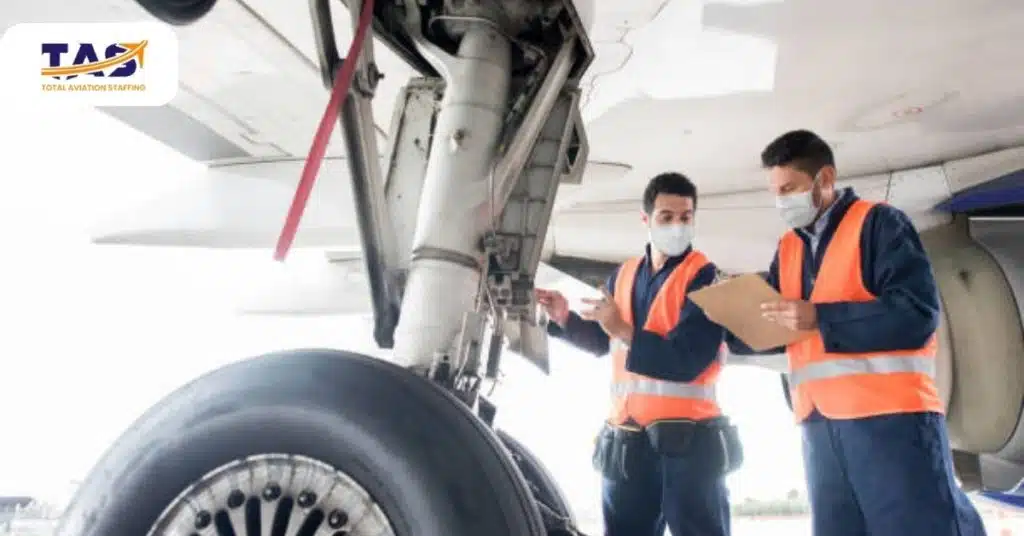The Importance of Quality Control in Aviation and the Role of Detail Inspector – Aircraft QC Inspector

The aviation industry’s growth emphasizes the increasing importance of quality control in ensuring the safety and performance of aircraft. Detail Inspector – Aircraft Quality Control inspectors play a crucial role in this industry by inspecting aircraft and ensuring their safety and airworthiness.
This article aims to delve into the Aircraft Quality Control Inspector’s role in aviation, the significance of Quality Control in this heavily regulated industry, and the benefits it brings in terms of air travel safety and maintenance practices.
By understanding the importance of Quality Control in aviation, we can appreciate the vital role played by Aircraft Quality Control Inspectors in ensuring safe and reliable air travel.
I. What is an Aircraft QC Inspector?
An Aircraft QC Inspector is a professional who ensures that all maintenance and repair work done on an aircraft meets safety and airworthiness standards. They conduct inspections and checks during and after maintenance work to make sure it has been done correctly and in compliance with FAA regulations and other industry standards.
An Aircraft QC Inspector is responsible for maintaining accurate records of all maintenance and inspection work done, as well as communicating any issues or concerns to other members of the maintenance team. They are an important part of ensuring the safety and reliability of aircraft and are a valuable member of any aviation maintenance team.

II. Benefits and Importance of Quality Control in Aviation
As a job seeker in the aviation industry, it’s important to understand the benefits and importance of quality control in aviation. Quality control ensures that aviation components and systems meet established standards of airworthiness, reliability, and safety.
Benefits of Quality Control in Aviation:
Increased Safety: One of the most important benefits of quality control in aviation is increased safety. Strict quality control measures ensure that aircraft components and systems meet established safety standards, reducing the risk of accidents and fatalities.
Improved Reliability: Quality control measures also improve the reliability of aircraft systems and components, reducing the risk of mechanical failure and unexpected downtime.
Cost Savings: Quality control measures can also lead to cost savings by reducing the need for repairs and replacements due to failures or malfunctions.
Compliance with Regulations: Quality control measures ensure that aviation components and systems comply with FAA regulations and other industry standards, reducing the risk of fines or other penalties.
Customer Satisfaction: Finally, quality control measures can lead to increased customer satisfaction by ensuring that aircraft are safe, reliable, and meet customer expectations.
Importance of Quality Control in Aviation:
Safety: The primary importance of quality control in aviation is safety. Strict quality control measures ensure that aircraft components and systems meet established safety standards, reducing the risk of accidents and fatalities.
Regulatory Compliance: Quality control measures are essential for compliance with FAA regulations and other industry standards, ensuring that aviation components and systems are safe, reliable, and meet regulatory requirements.
Reputation: Quality control measures are essential for maintaining a positive reputation in the aviation industry. Companies with a reputation for quality control are more likely to attract customers and maintain positive relationships with regulatory agencies.
Efficiency: Quality control measures can also improve efficiency by reducing the need for repairs and replacements due to failures or malfunctions.
Cost Savings: Finally, quality control measures can lead to cost savings by reducing the need for repairs and replacements, as well as fines or other penalties for non-compliance.
For job seekers in the aviation industry, it is crucial to comprehend the advantages and significance of quality control. Employers in this sector highly appreciate candidates who exhibit a strong understanding and dedication to ensuring safety in their work.

III. The Role of the Aircraft QC Inspector
Aircraft QC (Quality Control) Inspector is a vital role in the aviation industry, responsible for ensuring that aircraft maintenance and repairs are performed according to strict safety regulations and industry standards. This role is critical in maintaining the airworthiness and safety of aircraft and passengers.
Here are some key responsibilities and qualifications of an Aircraft QC Inspector:
Responsibilities:
Conducting detailed inspections of aircraft, including visual and mechanical checks of engines, airframes, and systems
Ensuring that all maintenance and repairs are performed according to regulations and industry standards
Reviewing maintenance records and documents to ensure compliance with regulations
Verifying that all parts and equipment used in maintenance and repairs meet safety standards
Providing guidance and support to maintenance and repair technicians
Identifying and reporting any safety issues or concerns to the appropriate personnel
Keeping up-to-date with changes in regulations and industry standards
Qualifications:
A&P (Airframe and Powerplant) license is usually required
Strong knowledge of aircraft maintenance, repair, and inspection procedures
Familiarity with FAA regulations and industry standards
Attention to detail and strong analytical skills
Strong communication and interpersonal skills
Ability to work in a fast-paced, dynamic environment
Flexibility and adaptability to changing circumstances and priorities
Being an Aircraft QC Inspector is a vital role in the aviation industry, and requires a combination of technical knowledge, attention to detail, and strong communication skills. If you’re interested in pursuing this career path, make sure to acquire the necessary qualifications and skills, and stay up-to-date with changes in regulations and industry standards.
.webp)
IV. The Necessity of Maintaining Quality Standards in the Aviation Industry
As a Detail Inspector – Aircraft QC Inspector, you play an important role in maintaining quality standards in the aviation industry. Adhering to strict quality standards is vital in ensuring the safety of passengers and crew on board aircraft, as well as complying with regulatory requirements and industry standards.
By upholding these standards, you help to minimize the risk of equipment failure and prevent accidents from happening, which ultimately improves the reputation of the airline or maintenance organization.

The Bottom Line
Quality control is a critical aspect of the aviation industry that cannot be overlooked. As an Aircraft Quality Control Inspector, you will play a crucial role in ensuring the safety and airworthiness of aircraft by carefully inspecting every component.
With a keen eye and a highly-attentive mindset, you will contribute to keeping passengers safe and ensuring the success of the aviation industry. If you are looking for a challenging and rewarding career that makes a difference, becoming an Aircraft Quality Control Inspector might just be the perfect fit for you!
Ready to take flight in a rewarding career that makes a difference? Become an Aircraft Quality Control Inspector today and join the aviation industry’s essential workforce! At Total Aviation Staffing, we can help you take the first step toward your dream job. Don’t wait any longer to pursue your passion and make a real impact. Contact us today and soar into the skies of success as an Aircraft Quality Control Inspector!
